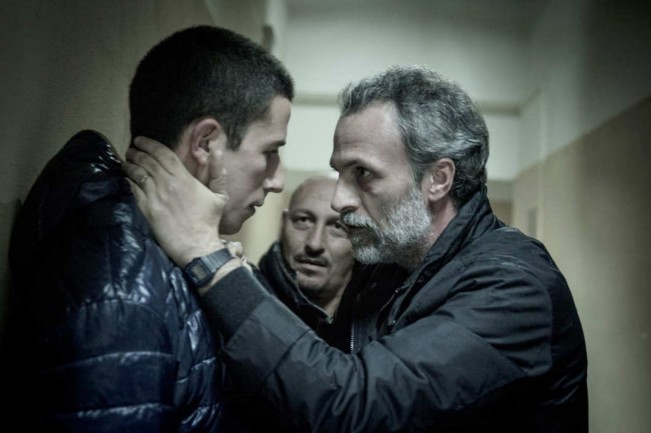

By Mike Wilmington Wilmington@moviecitynews.com
Wlmington on Movies: Black Souls
BLACK SOULS ( Four Stars)
Italy: Francesco Munzi, 2014
Dark, stark and bleak, and filled with a foreboding sense of impending disaster, Francesco Munzi’s Black Souls is an anti-romantic Italian mob drama — a great brooding powerhouse of a film that reminds you of violent mob classics like The Godfather and Goodfellas, and more recent Italian crime gems like Gomorrah, only to veer off into a shocking climax that’s more reminiscent in tone and impact of a Greek tragedy.
Adapted from the novel by Gioacchino Criaco, it’s a potent piece of crime-film-work. Munzi’s tale of three brothers, the Carbones of Calabria — whose family business and focus has evolved from goat farming in the mountain villages of Southern Italy, to membership in the local Calabrian mob, the ’ndrangheta, and into the more lucrative but dangerous profession of cocaine smuggling in Milan — has an almost mesmerizing force, a sinister visual poetry, the icy grip of a true thriller. There’s an almost swooning inevitability about the destruction that begins to overtake and swallow up these characters from the very first scenes, and one watches them struggle with a sense of unavoidable angst and heart-rending fitness.
Gradually, as Munzi shows the blood feuds that ultimately carry everyone away, we see the Carbone family fall apart: genial, glad-handing mob boss Luigi (Marco Leonardo), who wants everyone to love him (or, failing that, to respect him), Luigi‘s quieter, more sober mob-business-manager brother Rocco (Peppino Mazzotta), who wants the numbers to add up and any murderous business clashes to be avoided, and, most tragic of all, their non-criminal brother, goat farmer Luciana (Fabrizio Ferracane), who wants no part of his family’s illegal success — and his hot-headed, hedonistic 20-year-old son Leo (Giuseppe Fumo), who does. As the story unfolds, Munzi (The Rest of the Night) and his co-writers Fabrizio Ruggirellio and Maurizio Braucci immerse us in the long-held, meticulous traditions of their world (or of their separate worlds), and of their women, including Rocco‘s chic Northern Italian wife Valeria (Barbora Bobulova) and Luciano’s traditionalist country wife Antonia (Anna Ferruzzo). They then reveal how all that can collapse as well.
Munzi tells their story not with the hot-blooded operatic fervor we expect elsewhere, but with a mixture of quiet realism, dirge-like melancholy and low-key intensity — and with a simmering tension that always reminds you of the violence that lies just underneath the semblance of family bonds and feeling that supposedly unites all these Carbones. There’s scant romanticism here, and little wild humor — and no one will, like Leo, want to live this life after seeing what happens. That’s true of the Mafia masterpieces of Coppola and Scorsese as well. But it’s doubly true here — in this more classic, less sensational rendering of the wages of sin and death.
Munzi is not as brilliant a filmmaker as Coppola or Scorsese — or, probably, as his Italian colleague Matteo Garrone of Gomorrah. But he’s damned good. He knows how to create characters and the world they live in. Leonardi’s glad-handing mob boss Luigi, Mazzotta’s professorial Rocco and Ferracane’s pent-up, furious village patriarch Luciano make almost as powerful, if not quite as memorable a brotherly trio as Michael, Sonny and Fredo in The Godfather. But Munzi is building on past mob movie tropes and archetypes, not simply recapitulating them. The darkness of the Carbones’ world catches you almost as inexorably as its best predecessors. And, after hopping on the crazed rollercoasters of many modern crime and action shows, it’s refreshing to see a violent movie that makes sense, with characters that seem not just impossibly good or incredibly evil or wildly unlikely, but richly, fallibly, terrifyingly human. (In Italian, with subtitles.)
In Los Angeles, in Landmark’s Nuart Theatre. Also in Landmark Theatres across the country.
















Is, or will Black Souls be on DVD? Thank you in advance.